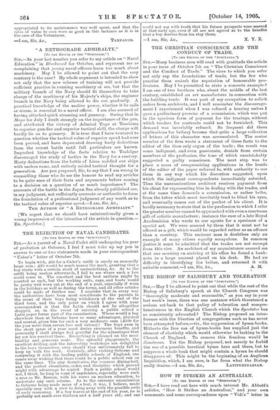THE CHRISTIAN CONSCIENCE AND THE CONDUCT OF TRADE.
LTO THE EDITOR OF THE .SPIICTAT011.1
Sin,—Many business men will read with gratitude the article in your issue of October 7th on "The Christian Conscience and the Conduct of Trade." The vices to which you refer not only sap the foundations of trade, but the few who practise them smirch the reputation of honourable pro- fessions. May I be permitted to state a concrete example ? I am one of two brothers who, about the middle of the last century, established an art manufacture in connection with the building trade. It was part of my occupatien to solicit orders from architects, and I well remember the discourage- ment I experienced when I was refused a bearing unless I gave a preliminary promise of a commission, which was put in the specious form of payment for the tracings, without which tenders for contracts could not be furnished. This demand was invariably refused. So frequent did these applications for bribery become that quite a large collection of letters of this character was accumulated. The senior member of the firm wrote a statement of these facts to the editor of the then only organ of the trade ; the result was some indignant, and even passionate, denials from certain members of the profession, the tone of which unmistakably suggested a guilty conscience. The next step was to place a mass of compromising applications in the hands of the editor of the paper referred to, with authority to use them in any way which his discretion suggested, upon which the indignant correspondents immediately subsided. Thus the unconscientious architect receives payment from his client for representing him in dealing with the trades, and at the same time demands a commission, or rather bribe, from the latter which must inevitably tend to blind his eyes, and eventually comes out of the pocket of his client. It is hardly necessary to state that in the profession to which I refer the greater number cannot be approached with even a courteous gift of artistic manufacture ; instance the case of a late Royal Academician who wrote to our agents for a specimen of a special art. We were assured by them that it must not be offered as a gift, which would be regarded rather as an offence than a courtesy. This eminent man is doubtless only an
example of many others equally scrupulous. In common Justice t must be admitted that the trades are not exempt from this vice. An architect of my acquaintance assured me that one morning on arriving at his office be found a bank- note to a large amount placed on his desk. He had no difficulty in identifying the briber, and returned it with suitable comment.—I am, Sir, &c., A. M.














































 Previous page
Previous page